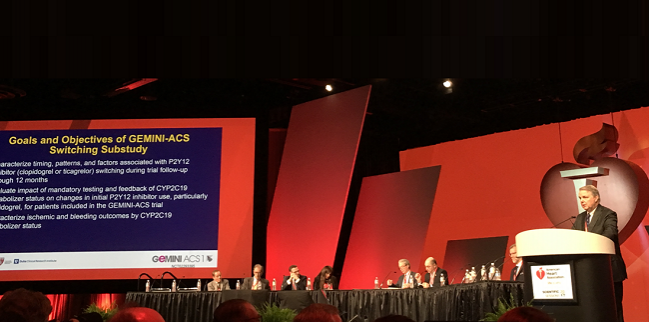GEMINI-ACS-1 Substudy: P2Y12 Inhibitor Switching Is Uncommon After ACS
The findings do not support the FDA’s mandate for genotyping patients in any clinical trial where clopidogrel is used, experts say.

ANAHEIM, CA—Making a switch from treatment with one P2Y12 inhibitor to another for any reason after an ACS is uncommon, but it’s more likely for patients initially treated with ticagrelor rather than clopidogrel, according to a new genetic subanalysis of a large ACS trial.
Prior research has been inconclusive as to whether genetic testing can accurately guide physicians on their antiplatelet agent choices following ACS. However, in 2010 the US Food and Drug Administration (FDA) mandated the addition of a black-box warning to clopidogrel labeling information recommending pharmacogenomic testing for patients with two loss-of-function alleles of the CYP2C19 gene, and the agency requires this testing in any clinical trial that uses clopidogrel.
To find out how much, if any, impact this information has on prescribing decisions, researchers led by E. Magnus Ohman, MD (Duke Clinical Research Institute, Durham, NC), looked at the 3,037 patients from the phase II GEMINI-ACS-1 study, which showed that the combination of low-dose rivaroxaban (Xarelto; Janssen Pharmaceuticals) and P2Y12 inhibition carries a bleeding risk similar to that seen with standard DAPT after ACS.
Reporting of CYP2C19 metabolizer status was required for all subjects, and this information was sent from the central lab to investigators within 1 week of randomization for 99% of patients. Of those, 34.4% were ultra-metabolizers, 37.8% extensive metabolizers, 24.5% intermediate metabolizers, and 3.2% reduced metabolizers, and no recommendations were given regarding P2Y12 inhibitor therapy choices, Ohman reported. At the time of randomization, investigators were asked to say what their expected prescribing decisions around switching would be prior to knowing CYP2C19 status.
In total, 6.5% of patients had their P2Y12 inhibitors switched after a mean of 40 days. Ticagrelor switching occurred more often than clopidogrel switching (P < 0.001)—144 patients switched from ticagrelor to clopidogrel after a mean 62.5 days and 53 switched from clopidogrel to ticagrelor at a mean 30 days. Reasons for switching from ticagrelor to clopidogrel were mostly due to nonbleeding adverse events, while CYP219 status was the driver for most patients who switched from clopidogrel to ticagrelor. However, of the 611 clopidogrel-treated patients who physicians initially said they would switch based on pharmacogenomic information, only 34 were actually switched. Similarly, of the 96 ticagrelor-treated patients who physicians thought would be switched, only 14 ultimately were. Switching was most common in patients who were reduced metabolizers and those who were in North America and Western Europe.
Ohman said the trial was underpowered to assess ischemic and bleeding outcomes, but noted there was no statistically significant difference by CYP2C19 metabolizer status in terms of CV death, MI, stroke, and definite stent thrombosis, although numerically the reduced metabolizers had the lowest rate. TIMI major/minor and GUSTO life-threatening/severe or moderate bleeding were similar throughout.
The findings “do not support the utility of mandatory testing of CYP2C19 metabolizer status in this context as the majority of investigators did not act on the information,” Ohman concluded. Future studies, however, should determine the clinical importance of tailored P2Y12 therapy based on the prospective genotype testing result.”
Genotyping Utility Questioned
Discussing the study, Paul Gurbel, MD (Inova Heart and Vascular Institute, Falls Church, VA), said the “major rationale for genotyping in GEMINI-ACS was the potential lack of low-dose rivaroxaban efficacy as the sole antithrombotic in high-risk clopidogrel nonresponders. And indeed this was the major concern of the regulatory authorities.”
It is known that 2% of white, 4% of black, and 14% of Asian patients are genetically predicted to be poor metabolizers, he explained. “That is, they will have zero-to-low platelet inhibition of clopidogrel—they're highly resistant to clopidogrel—and blanket therapy with potent P2Y12 inhibitors we all know is associated with more bleeding. That may not be the answer to the clopidogrel resistance story. Yet we have no large-scale prospective data to support genotype-based personalization, and I think that tempers the enthusiasm of investigators to do genotyping and [act] on the genotype.”
Commenting on the study, Ori Ben-Yehuda, MD (Cardiovascular Research Foundation, New York, NY), told TCTMD that this GEMINI-ACS-1 substudy is “really interesting and well conducted.” Since little data exist supporting the clinical utility of genotyping testing, he said he is “not surprised that the incidence of switching even in the [reduced metabolizers] was not universal.”
Ben-Yehuda noted that “genotyping has not been adopted in clinical practice and is unlikely to be adopted” outside of clinical trials where it is mandated. “The results of this fascinating analysis do not support this position by the FDA, which imposes a significant burden on already complicated and costly clinical trials,” he argued.
The results of this fascinating analysis do not support this position by the FDA, which imposes a significant burden on already complicated and costly clinical trials. Ori Ben-Yehuda
Indeed, Gurbel added, the trial “provides insight into the cardiologist perception of genotyping utility. . . . Thus, the burning question about the efficacy of treating high-risk clopidogrel nonresponders with low-dose rivaroxaban [and] the deletion of aspirin remains unresolved.”
But in the future, with the advent of bedside genotyping, perhaps additional positive prospective clinical trial data will facilitate “personalization” and garner the interest of trial investigators who may be more open to switching medications in poor responders, he concluded.
Yael L. Maxwell is Senior Medical Journalist for TCTMD and Section Editor of TCTMD's Fellows Forum. She served as the inaugural…
Read Full BioSources
Ohman EM. P2Y12 inhibitor switching in response to routine notification of CYP2C19 clopidogrel metabolizer status following acute coronary syndromes. Presented at: American Heart Association 2017 Scientific Sessions. November 14, 2017. Anaheim, CA.
Disclosures
- Ohman, Gurbel, and Ben-Yehuda report no relevant conflicts of interest.


Comments